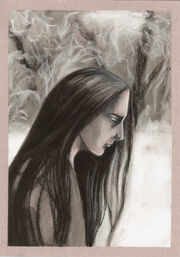Daeron was a Sindarin elf of Doriath and King Thingol's loremaster and minstrel. Because of his love for Lúthien, he was jealous of Beren Erchamion, and was a key figure in the betrayal of their love to Thingol.[1]
Daeron was a brilliant loremaster and also the greatest musician of all the Children of Ilúvatar. Second to him was only Maglor, one of infamous Fëanor's sons.[1]
Biography[]
Daeron was born in Middle-earth at some undetermined time during the Years of the Trees. Following the folk of Elwë, he became an important elf close to King Thingol, serving as his loremaster and minstrel. He devised the Cirth (familiarly known as Angerthas Daeron) that would later become an important writing form not only for the Sindar, but also for the Dwarves who adopted and spread them throughout Middle-earth down from age to age.[2] These runes would later become the script used in Moria and Erebor.
Twenty years after the Return of the Ñoldor, Daeron and his kinsman Mablung both attended the Mereth Aderthad near the Eithel Ivrin to bear greetings from Thingol as his messengers to Fingolfin, High King of the Ñoldor.[3]
Daeron loved Thingol's daughter Lúthien more than anything, devising music in her honor and often played it while she danced. However, she did not return his affections. Hundreds of years later, when Beren crossed the Girdle of Melian and came to Doriath, he and Lúthien fell in love, though they kept it secret from Thingol, knowing he would not approve of his daughter promising herself to a mortal Man. However, Daeron's jealousy of their love for each other caused him to spy on them both and report what he saw and heard to Thingol.[1]

Daeron's sorrow, by Marya Filatova
Later, when Lúthien learned Sauron had imprisoned her beloved Beren, she sought Daeron's counsel but he betrayed her to the king, causing her to be imprisoned in Hírilorn. After she had escaped and went away to find Beren and was feared to be lost, Daeron repented his previous deeds and left Doriath to search for her in vain. He lost his way and never returned to Doriath passing over the Blue Mountains, where he dwelt long after in dark places lamenting his love for Lúthien. His ultimate fate or whereabouts afterwards are not known.[1]
Etymology[]
His name is derived from the Sindarin word daer ("large, great"), and should be pronounced DYE-ron.
In earlier etymologies of the legendarium the Doriathrin name is given as Dairon, of which the root was the Doriathrin word for shadow, dai. Consequently, Christopher Tolkien speculated in The Silmarillion that the name perhaps included the Sindarin word dae "shadow".
In other versions[]
He was counted among the greatest minstrels of the Elves, along with Maglor, Ivárë and Tinfang.[4][5]
Translations[]
| Foreign Language | Translated name |
| Amharic | ዴሮን |
| Arabic | ضايرون |
| Armenian | Դաերոն |
| Belarusian Cyrillic | Даэран |
| Bengali | দাইরন |
| Bulgarian Cyrillic | Даерон |
| Georgian | ძაერონი |
| Greek | Ντάερον |
| Gujarati | ડએરોન |
| Hebrew | דאירון |
| Hindi | डएरोन |
| Japanese | デロン |
| Kazakh | Даерон (Cyrillic) Daeron (Latin) |
| Kannada | ಡರೊನ |
| Korean | 다이론 |
| Kyrgyz Cyrillic | Даэрон |
| Macedonian Cyrillic | Даерон |
| Marathi | डायरोन |
| Mongolian Cyrillic | Даерон |
| Nepalese | डएरोन |
| Pashto | ضاېرون |
| Persian | ضاهرون ? |
| Punjabi | ਡੈਰਨ |
| Russian | Даэрон |
| Sanskrit | डएरोन् |
| Serbian | Даерон (Cyrillic) Daeron (Latin) |
| Sinhalese | ඩෙරොන් |
| Tajik Cyrillic | Даерон |
| Tamil | தேரோன் |
| Telugu | డఎరొన |
| Ukrainian Cyrillic | Даерон |
| Urdu | دایراون |
| Uzbek | Даерон (Cyrillic) Daeron (Latin) |
| Yiddish | דאַעראָן |
References[]
- ↑ 1.0 1.1 1.2 1.3 The Silmarillion, Quenta Silmarillion, Chapter XIX: "Of Beren and Lúthien"
- ↑ The Silmarillion, Quenta Silmarillion, Chapter X: "Of the Sindar"
- ↑ The Silmarillion, Quenta Silmarillion, Chapter XIII: "Of the Return of the Noldor"
- ↑ The History of Middle-earth, Vol. II: The Book of Lost Tales Part Two, chapter I: "The Tale of Tinúviel"
- ↑ The History of Middle-earth, Vol. III: The Lays of Beleriand, chapter III: "The Lay of Leithian"
